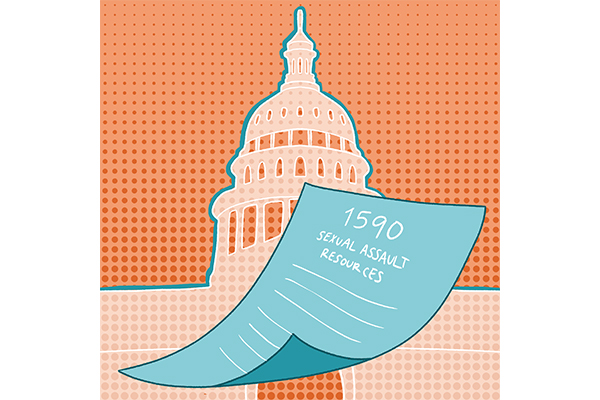Research by UT’s Institute on Domestic Violence & Sexual Assault found service gaps in sexual assault survivor’s resources in Texas, including mental health and legal services.
The research was authorized by the passage of House Bill 1590 and administered through the Sexual Assault Survivors’ Task Force in the governor’s office, said Bruce Kellison, co-director of the Institute. He said the task force was formed during the last Texas legislative session.
“The last session ended with a broad call for more research on the experiences and resources available to sexual assault survivors in the state of Texas,” Kellison said. “We were asked by this task force in the governor's office to do a resource inventory of all of the resources available to survivors across the state.”
Kellison said his team of researchers distributed a survey to 342 Texan providers who serve survivors in 209 Texas counties. The survey found three main categories where providers said they could not meet the needs of survivors: mental health services, outreach and prevention and legal services.
Holly Bowles, a Stop Abuse for Everyone Alliance sexual assault advocacy volunteer coordinator, said SAFE provides the services outlined in the institute’s study but struggles with funding to offer enough resources. The SAFE Alliance is a local organization that serves survivors of sexual violence, domestic violence, sex trafficking and child abuse, Bowles said in an email.
“The various gaps in those services, such as the need for more counselors and the long waitlists for housing, are issues that we continue to struggle with,” Bowles said. “One of the biggest barriers that prevents service providers, including SAFE, from closing those gaps is the lack of resources.”
Kellison said the switch to online services due to the pandemic magnified issues. He said slow broadband does not support Zoom in rural areas, so parts of the state including West Texas and the upper-Rio Grande Valley have seen the most decline in their ability to provide services during the pandemic.
“This lack of in-person client contact, the service providers are saying, is really making it really tough on these survivors,” Kellison said.
Bowles said SAFE collaborates with other advocacy organizations, and it will use the institute’s study to improve their service.
“We can also use information like this as we advocate for policies that better support survivors and provide more funding for these essential resources as well,” Bowles said.
Ginny Maril, associate director for clinical services in the Counseling and Mental Health Center, said CMHC provides individual and group counseling for survivors virtually.
“In the event that students do not have a private space to speak with a counselor, we can provide one on campus for telehealth appointments,” Maril said in an email.
Architectural engineering freshman Galilea Gutierrez said UT should improve its sexual assault resource education during orientation because the sexual assault modules assigned to students are often rushed through.
“COVID has made a (number) of things more difficult to achieve and learning about sexual assault resources is one of them,” Gutierrez said. “It’s made it more difficult for the University to get a hold of students and ensure that they are doing these assignments with intent to learn.”
Students can call 512-471-3515 to speak with a UT counselor for support, Maril said.





















